
Healthcare
Scope & Guideline
Fostering collaboration for transformative health advancements.
Introduction
Aims and Scopes
- Patient-Centered Care:
The journal emphasizes the importance of involving patients in their care processes, addressing their preferences, needs, and values to improve health outcomes. - Innovative Therapeutic Interventions:
Research on novel treatment modalities, including the use of technology (e.g., telehealth, virtual reality), is a consistent focus, aiming to enhance patient engagement and treatment effectiveness. - Mental Health and Well-Being:
A significant portion of the journal's articles explores mental health issues, including the psychological impacts of chronic illness, the effects of caregiving, and strategies for improving mental well-being in various populations. - Chronic Disease Management:
The journal contains numerous studies on the management and prevention of chronic diseases, highlighting innovative strategies for improving quality of life and health outcomes. - Healthcare Systems and Policy:
Research examining the structure, efficacy, and equity of healthcare systems, as well as the socio-economic determinants affecting health outcomes, is a core area of interest. - Interprofessional Collaboration:
The journal promotes research that fosters teamwork among various healthcare professionals to improve healthcare delivery and patient outcomes. - Public Health and Community Health Initiatives:
Articles often focus on public health strategies, community health interventions, and the role of social determinants in health disparities.
Trending and Emerging
- Digital Health and Telemedicine:
The rapid adoption of telehealth solutions and digital health technologies is a prominent theme, especially in response to the COVID-19 pandemic, highlighting the need for accessible healthcare delivery. - Mental Health Integration:
There is a growing emphasis on integrating mental health care into primary and chronic disease management, recognizing the interdependent nature of physical and mental health. - Social Determinants of Health:
Research increasingly addresses social determinants of health, focusing on how factors like socioeconomic status, education, and community resources impact health outcomes and healthcare access. - Patient Empowerment and Self-Management:
Studies exploring strategies that empower patients to take an active role in their health management are on the rise, reflecting a shift towards personalized and participatory healthcare. - Innovations in Rehabilitation and Recovery:
Emerging themes include the development of innovative rehabilitation programs, particularly those leveraging technology to enhance recovery processes for various conditions. - Health Equity and Disparities:
There is an increasing focus on health equity, examining disparities in healthcare access and outcomes among marginalized populations, and identifying strategies to address these challenges. - Artificial Intelligence in Healthcare:
The application of AI and machine learning in diagnostic processes, treatment personalization, and healthcare delivery is trending, reflecting a technological transformation in the field.
Declining or Waning
- Traditional Medical Approaches:
There has been a noticeable decline in research focused on traditional medical practices, as the journal increasingly emphasizes innovative and technology-driven solutions for healthcare challenges. - Pharmaceutical Interventions:
Research specifically targeting pharmaceutical solutions, particularly in isolation from holistic or integrative approaches, appears to be waning as interdisciplinary methods gain traction. - Invasive Procedures:
There seems to be a reduction in studies centered on invasive medical procedures, with a growing preference for non-invasive or minimally invasive techniques that align with patient comfort and safety. - Single-Disease Focus:
Research that concentrates solely on single-disease studies is decreasing, as integrated approaches that consider multi-morbidity and holistic patient care are becoming more prevalent. - Basic Health Education Programs:
The focus on basic health education programs without the incorporation of technology or modern engagement strategies is diminishing, reflecting a shift towards more interactive and digital methods.
Similar Journals
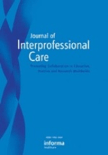
Journal of Interprofessional Care
Bridging disciplines to enhance patient outcomes.The Journal of Interprofessional Care, published in the United Kingdom, is a premier scholarly outlet dedicated to advancing the field of interprofessional collaboration and healthcare delivery. With a notable impact factor signifying its relevance and influence, this journal holds a distinguished position in the Q1 category of Medicine, ranking #77 out of 636 in the broader field of General Medicine according to Scopus. Since its inaugural publication in 1986, it has served as a vital platform for researchers, practitioners, and students who seek to explore the synergies among various healthcare disciplines, ultimately aiming to improve patient outcomes and care integration. The journal’s rigorous peer-review process ensures high-quality contributions that enhance our understanding of collaborative practices in healthcare. Though currently not an open-access journal, it continues to provide a wealth of knowledge for those invested in interprofessional education and practice.

Risk Management and Healthcare Policy
Navigating the complexities of healthcare risk with expert analysis.Risk Management and Healthcare Policy is an esteemed Open Access journal published by DOVE MEDICAL PRESS LTD, dedicated to advancing the fields of health policy and public health. Established in 2008, the journal fosters a rich dialogue among researchers, professionals, and students, focusing on innovative strategies for managing risks within healthcare systems. With a current impact factor reflected in its robust Scopus rankings—placing it in the top quartile (Q2) in both Health Policy and Public Health, Environmental and Occupational Health—the journal is a pivotal resource that shares critical insights and evidence-based practices. The journal not only covers empirical studies and analytical research but also promotes discussions on emerging challenges and opportunities within the healthcare sector. As a result, Risk Management and Healthcare Policy serves as a vital platform for disseminating high-quality research, fostering collaboration, and informing policy decisions aimed at enhancing health outcomes globally.
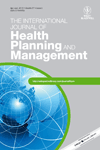
INTERNATIONAL JOURNAL OF HEALTH PLANNING AND MANAGEMENT
Advancing health systems through innovative research.INTERNATIONAL JOURNAL OF HEALTH PLANNING AND MANAGEMENT is an esteemed publication within the fields of Health Policy and Medicine, published by WILEY, a renowned academic publisher based in the United Kingdom. Since its inception in 1985, this journal has been at the forefront of advancing knowledge and practice in health planning and management, drawing on a diverse range of empirical and theoretical research to inform policy and improve health outcomes. With an impressive impact factor and ranked in the top quartile for both health policy and miscellaneous medicine, the journal is committed to publishing high-quality research that meets the needs of practitioners, policymakers, and scholars alike. Currently, it operates without open access, ensuring that all published articles maintain a rigorous standard of peer review while providing an essential platform for dialogue among professionals in the field. The INTERNATIONAL JOURNAL OF HEALTH PLANNING AND MANAGEMENT continues to play a vital role in shaping health systems and policies, making it an indispensable resource for anyone involved in health research and management.

JMIR Medical Informatics
Exploring the Intersection of Technology and MedicineJMIR Medical Informatics is a leading open access journal dedicated to the field of medical informatics, published by JMIR Publications, Inc. since 2013 in Canada. With an impressive impact factor and a distinguished Q2 ranking in both Health Informatics and Health Information Management categories, this journal plays a pivotal role in disseminating cutting-edge research and innovative practices. Covering a wide scope that includes clinical informatics, health information systems, and data analytics, JMIR Medical Informatics provides valuable insights for researchers, practitioners, and policymakers alike. The journal is accessible to a global audience, ensuring that pioneering studies and methodologies reach those who can apply them to enhance health outcomes. With its commitment to advancing the body of knowledge in medical informatics, this journal stands as a vital resource for anyone involved in or studying the intersection of healthcare and technology.
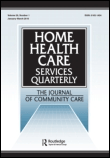
HOME HEALTH CARE SERVICES QUARTERLY
Fostering Dialogue for Better Health OutcomesHOME HEALTH CARE SERVICES QUARTERLY, an esteemed publication by Taylor & Francis Ltd, has been a cornerstone of scholarly discourse in the fields of community and home care since its inception in 1979. With ISSN 0162-1424 and E-ISSN 1545-0856, this quarterly journal promotes rigorous research and innovative practices in home health care services, significantly impacting health policy and public health discussions. The journal enjoys a respectable Impact Factor, reflecting its contributions to the field, and currently ranks Q2 in Community and Home Care, along with Q3 status in both Health Policy and Public Health. Researchers, professionals, and students alike can benefit from the diverse range of articles that address practical challenges and emerging trends within the home health care industry. Although not an open-access journal, it continues to provide a vital platform for advancing knowledge and disseminating best practices essential for improving health outcomes. As it embarks on its journey towards 2024, it remains committed to fostering an inclusive dialogue that shapes the future of home health care.

BMJ Leader
Elevating Healthcare Leadership through Insightful ResearchBMJ Leader, published by the esteemed BMJ PUBLISHING GROUP, is a vital resource for those engaged in the fields of Health Policy, Leadership and Management, and Strategy and Management. Since its inception in 2017 and spanning through 2024, this journal serves as a conduit for innovative research and practical insights that empower healthcare leaders and professionals to navigate complex challenges in modern healthcare systems. With an impressive standing in the Q2 and Q3 category quartiles and significant rankings within Scopus profiles for its relevant disciplines, BMJ Leader plays an essential role in shaping the discourse around effective leadership and strategy in health and management. Despite its open access status, the journal maintains a high impact factor, highlighting the relevance and quality of its content. As the landscape of healthcare continues to evolve, BMJ Leader remains committed to fostering collaboration and knowledge sharing among researchers, practitioners, and students alike, making it an indispensable addition to the academic community.

Family Medicine and Primary Care Review
Your gateway to groundbreaking research in primary care.Family Medicine and Primary Care Review, published by TERMEDIA PUBLISHING HOUSE LTD, is a significant open-access journal dedicated to advancing the field of primary care and family medicine. Since its inception in 2006, the journal has fostered an environment for the dissemination of innovative research, clinical practices, and reviews relevant to general medicine, securing its place within the Q4 category in the 2023 journal rankings. With an emphasis on accessibility since 2008, it aims to bridge gaps in medical knowledge and practice, contributing to the global conversation on healthcare delivery. Located in Poland, the journal serves as a valuable resource for researchers, healthcare professionals, and students alike, providing insights and developments that shape the future of primary care. With a Scopus rank of #317 out of 636 in the field of general medicine, it stands as a credible source of information for those committed to improving health outcomes in local and international communities.

International Journal of Care Coordination
Pioneering insights into care coordination excellence.Welcome to the International Journal of Care Coordination, a premier scholarly platform dedicated to advancing knowledge in the critical areas of Health Policy and Leadership and Management. Published by SAGE Publications Ltd in the United Kingdom, this journal serves as a vibrant forum for interdisciplinary research, discussions, and innovations in care coordination, aiming to enhance patient outcomes through effective management strategies. With an ISSN of 2053-4345 and an E-ISSN of 2053-4353, this journal boasts a solid track record since its inception in 2014, achieving a commendable ranking in Scopus that reflects its influential contribution to the fields of Nursing and Health Policy. Although it operates under a subscription model, researchers and practitioners will find invaluable insights and evidence-based articles that address current challenges and emerging trends in healthcare coordination. Join us in exploring ways to transform care practices and improve health systems globally, while benefiting from the journal’s reputable standing, classified in Q3 category quartiles as of 2023.
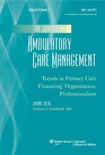
JOURNAL OF AMBULATORY CARE MANAGEMENT
Elevating standards in ambulatory care management and policy.JOURNAL OF AMBULATORY CARE MANAGEMENT, published by Lippincott Williams & Wilkins, is a leading peer-reviewed journal dedicated to advancing research and practice in the field of health policy, with a specific focus on ambulatory care management. Since its inception in 1978, this journal has served as a critical platform for disseminating innovative studies, insights, and methodologies that inform policy makers, healthcare professionals, and academic researchers alike. By maintaining an impressive ranking within the Q3 category in Health Policy and a Scopus rank of 148 out of 310, it underscores the journal's growing influence in shaping health policy discussions and decisions. The journal operates on a traditional subscription model, ensuring a high-quality review process while remaining accessible to those wishing to subscribe. With an ongoing commitment to excellence, the JOURNAL OF AMBULATORY CARE MANAGEMENT is essential for anyone involved in improving outcomes in ambulatory care settings and influencing health policy reforms, making it a must-read for researchers, practitioners, and students aiming to stay at the forefront of healthcare innovation.
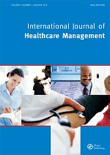
International Journal of Healthcare Management
Transforming healthcare management for better outcomes.The International Journal of Healthcare Management, published by ROUTLEDGE JOURNALS, TAYLOR & FRANCIS LTD, stands as a crucial platform for the dissemination of innovative research and insights in the realm of healthcare management. With a focus on health policy, leadership, and management, this journal aims to bridge the gap between theory and practice, providing a valuable resource for researchers, professionals, and students alike. It boasts an impressive Q2 ranking in Leadership and Management and a Q3 ranking in Health Policy for 2023, highlighting its influence and relevance within the academic community. With an accessible ISSN of 2047-9700 and E-ISSN of 2047-9719, the journal features an array of peer-reviewed articles that promote the advancement of knowledge and best practices in healthcare settings. While currently not offered as open access, the journal publishes high-quality research that underscores the importance of effective management strategies in enhancing healthcare outcomes. Positioned in the United Kingdom, the journal continues to contribute significant knowledge and frameworks that guide healthcare leaders and policymakers in navigating the complexities of governance in health services.